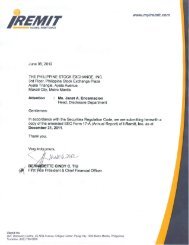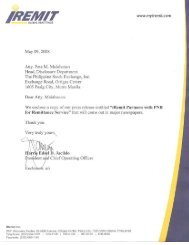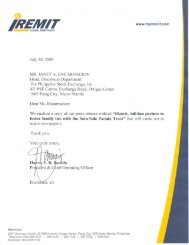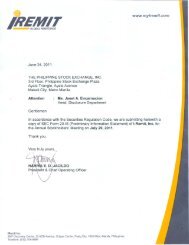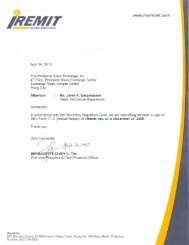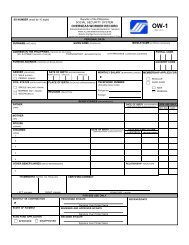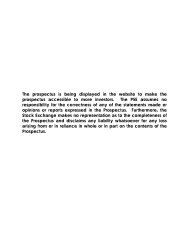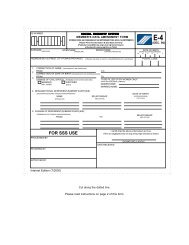SEC Form 20-IS - iRemit Global Remittance
SEC Form 20-IS - iRemit Global Remittance
SEC Form 20-IS - iRemit Global Remittance
You also want an ePaper? Increase the reach of your titles
YUMPU automatically turns print PDFs into web optimized ePapers that Google loves.
Summary of Significant Accounting Policies<br />
Financial Instruments - Initial Recognition and Subsequent Measurement<br />
Initial Recognition<br />
Financial instruments within the scope of PAS 39 are classified as financial assets at<br />
FVPL, loans and receivables, held-to-maturity (HTM) investments, available-for-sale<br />
(AFS) investments, financial liabilities at FVPL and other financial liabilities. The<br />
classification of financial instruments at initial recognition depends on the purpose for<br />
which the financial instruments were acquired and their characteristics. All financial<br />
assets and financial liabilities are recognized initially at fair value plus any directly<br />
attributable cost of acquisition or issue, except in the case of financial assets and<br />
financial liabilities at FVPL. Management determines the classification of its instruments<br />
at initial recognition and, where allowed and appropriate, re-evaluates such designation<br />
at every balance sheet date.<br />
Financial instruments are recognized in the consolidated balance sheet when the Group<br />
becomes a party to the contractual provisions of the instrument. In the case of regular<br />
way of purchase or sale of financial assets, recognition and derecognition, as applicable,<br />
are done using settlement date accounting. Settlement date accounting refers to (a)<br />
recognition of an asset on the day it is received by the Group, and (b) the derecognition<br />
of an asset and recognition of any gain or loss on disposal on the day that it is delivered<br />
by the Group.<br />
The subsequent measurement bases for financial instruments depend on its<br />
classification.<br />
As of March 31, <strong>20</strong>12 and December 31, <strong>20</strong>11, the Group has no AFS investments, HTM<br />
investments and financial liabilities at FVPL.<br />
Subsequent Measurement<br />
Financial assets at FVPL<br />
Financial assets at FVPL includes financial assets held for trading (HFT) and financial<br />
assets designated upon initial recognition at fair value through profit or loss. Financial<br />
assets are classified as HFT if they are acquired for the purpose of selling and<br />
repurchasing in the near term. Included in this classification are debt securities which<br />
have been acquired principally for trading purposes.<br />
The Group evaluates its HFT investments to determine whether the intention to sell them<br />
in the near term is still appropriate. When in rare circumstances the Group is unable to<br />
trade these financial assets due to inactive markets and management’s intention to sell<br />
them in the foreseeable future significantly changes, the Group may elect to reclassify<br />
these financial assets. The reclassification to loans and receivables, AFS or HTM<br />
depends on the nature of the asset. This evaluation does not affect any financial assets<br />
designated at FVPL using the fair value option at designation, these instruments cannot<br />
be reclassified after initial recognition.<br />
HFT investments are recorded in the consolidated balance sheet at fair value. Changes<br />
in fair value are recognized as ‘Net trading gains’ in the consolidated statement of<br />
income. Interest earned is recognized as interest income included under ‘Other income’<br />
in the consolidated statement of income. Quoted market prices, when available, are<br />
used to determine the fair value of these financial instruments. If quoted market prices<br />
are not available, their fair values are estimated based on inputs that are observable in<br />
the market.<br />
18



